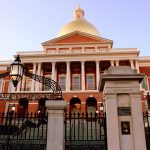Legislation and public policy provide the basis for action on climate change and the transition to the net zero economy. Passage of the Global Warming Solutions Act in August 2008 established Massachusetts as a leader in climate policy. Since that time, Massachusetts has established itself as a national leader in climate change and clean energy legislation and policy.
Massachusetts cities and towns (such as Needham) exercise powers and responsibilities that have been delegated to them under the Massachusetts Constitution. Their leadership and action are also critical to achieving climate and clean energy goals.
State Government – Legislation and Policy
 The work of the Massachusetts legislature and executive agencies through multiple gubernatorial administrations has been the basis for many local projects such as both Solarize Needham campaigns, the RTS solar array and the availability of no-cost home energy assessments and weatherization rebates.
The work of the Massachusetts legislature and executive agencies through multiple gubernatorial administrations has been the basis for many local projects such as both Solarize Needham campaigns, the RTS solar array and the availability of no-cost home energy assessments and weatherization rebates.
Green Needham has maintained an active dialogue and a productive long-term relationship with our legislators in support of this work. Legislation is implemented in regulation and policy. The size and the scope of the climate change and energy transition are such that legislation is not “one and done”.
Policy is developed and executed by the Governor and his or her appointees; executive agencies of the Commonwealth develop regulations that implement laws passed by the Legislature and signed by the Governor. As results of the legislation and policy emerge, changes are often made.
While we don’t have a specific legislative advocacy team, our ongoing work with Representative Denise Garlick and Senator Becca Rausch are important to the success of the work we do. We also maintain relationships and support organizations that are focused on advocacy.
Town Government – Legislation and Policy
 Green Needham has been engaged with local legislation and policy since its inception. This work with Town Boards and staff has been central to many of our projects, past and present. We have built and maintain relationships across our Town government to advance our work.
Green Needham has been engaged with local legislation and policy since its inception. This work with Town Boards and staff has been central to many of our projects, past and present. We have built and maintain relationships across our Town government to advance our work.
Town Meeting is the legislative branch of town government.
The Select Board leads the executive branch of town government. These elected leaders set policy and hire a professional chief executive (the Town Manager) to implement those policies and oversee operation of the Town.
The School Committee is the executive board that oversees the Needham Public Schools. As with the Select Board, the elected members of the School Committee set policy and hire a professional chief executive (the Superintendent) to implement those policies and run the schools.
Other elected boards, such as the Planning Board oversee areas of policy but do not directly manage their departments (the Town Manager supervises all town departments other than the schools).
Legislative update – January 2024
In March 2021, Gov. Charlie Baker signed into law An Act Creating a Next-Generation Roadmap for Massachusetts Climate Policy. A key goal of this bill is to create a net-zero greenhouse gas emission limit by 2050, with interim goals in 2030 and 2040. Some of the aspects that this bill covers are Building Improvements, Environmental Justice, Renewable Energy Access, Renewable Energy Goals for Municipal Light Plants, Gas Safety, Job Creation, and more! The Specialized Opt-In Building Code, which Needham adopted in 2023, was created pursuant to this legislation. Read this article by wbur for more information.
In August 2022, Gov. Charlie Baker signed into law An Act Driving Clean Energy and Offshore Wind. This law builds on the Massachusetts Climate Roadmap by providing more details on how the state can reach its clean energy goals by 2050. Read this article by wbur for more information.
For information on 2023-2024 legislative priorities, see this list by Mass Power Forward.

